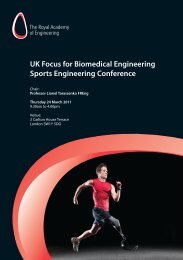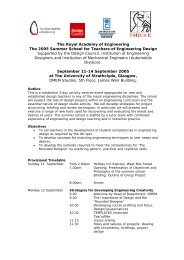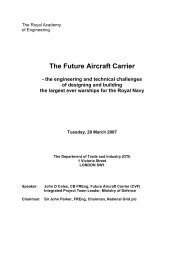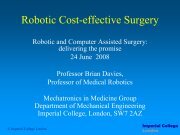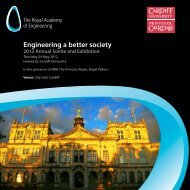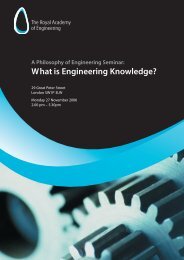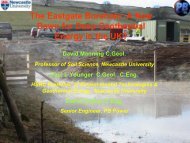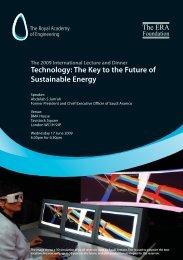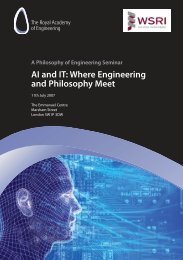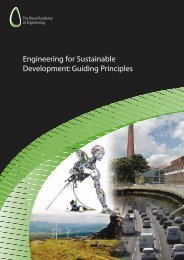Engineering graduates for industry - Royal Academy of Engineering
Engineering graduates for industry - Royal Academy of Engineering
Engineering graduates for industry - Royal Academy of Engineering
Create successful ePaper yourself
Turn your PDF publications into a flip-book with our unique Google optimized e-Paper software.
During the running <strong>of</strong> the project, the teams have a <strong>for</strong>mal meeting every week with their facilitator and each member<br />
<strong>of</strong> the team takes a turn to chair this meeting, which is assessed. The teams produce specific reports <strong>for</strong> each<br />
component <strong>of</strong> the project, plus a summary report. The students are required to append their percentage contribution<br />
to each report and these reports are assessed by the respective experts. All <strong>of</strong> the assessments are moderated to try to<br />
eliminate discrepancies and scoring differences between facilitators. There is a strong peer assessment component to<br />
the projects.<br />
Effective practice exemplar 7: student-led activities at Imperial<br />
Student-led activities are organised by the engineering students themselves. There are active student societies <strong>for</strong> many<br />
<strong>of</strong> the engineering disciplines and many <strong>of</strong> these additional activities arise out <strong>of</strong>, or are supported by, these societies.<br />
Many <strong>of</strong> the student-led activities provide a high level <strong>of</strong> experience-led learning and involve intensive and extensive<br />
organisational, management and communication capabilities.<br />
The El Salvador project 58<br />
A group <strong>of</strong> around 11 Civil <strong>Engineering</strong> student volunteers makes an annual six week trip to El Salvador to involve<br />
themselves in construction projects such as building earthquake-safe housing and schools in the country. Students<br />
have to pay £400 and source the remaining required funding themselves each year <strong>for</strong> materials and accommodation,<br />
supported by the department. The additional funding generally comes from <strong>industry</strong> and alumni, but recently a group<br />
was awarded a JP Morgan Good Venture Award. Other similar expeditions go to different countries.<br />
Racing Green 59<br />
This is a project to design, build and race in international competition a zero-emissions car. It was spearheaded in<br />
2006/07 in response to the predicted need <strong>of</strong> automotive companies <strong>for</strong> <strong>graduates</strong> specifically trained in these new<br />
technologies. A small core group <strong>of</strong> 13 students was<br />
assembled and, with seed funding <strong>of</strong> £30,000 from<br />
EnVision, they made a fuel cell powered go-kart over<br />
the summer vacation in 2007. This was well received<br />
by the students and a further £70,000 was obtained<br />
from EnVision to build a second generation go-kart <strong>for</strong><br />
Formula Zero 60 and also to build a hydrogen fuel cell<br />
racing car to enter into the Institution <strong>of</strong> Mechanical<br />
Engineers’ (IMechE) Formula Student competition. In<br />
2008/09 this attracted 100 students from eight<br />
departments. In order to make the activity sustainable<br />
it has been handed over to the students who raise the<br />
funds (about £100,000 per year) and run the project<br />
themselves, reporting on a monthly basis to a Steering<br />
Group <strong>of</strong> academics from each <strong>of</strong> the departments.<br />
Students participate in Racing Green on either a<br />
voluntary basis or as part <strong>of</strong> the curriculum.<br />
Perceived benefits<br />
Involvement in student-led activities demonstrates key qualities <strong>of</strong> <strong>graduates</strong> to potential employers. Proactive studentled<br />
activities can provide direct benefits to departments too. For example, the Department <strong>of</strong> Materials no longer takes<br />
students on visits to <strong>industry</strong> but sponsors the Materials student society (MatSoc) to organise such visits. The various<br />
alumni associations are <strong>of</strong>ten financially supportive <strong>of</strong> student-led activities. The students benefit from the funding and<br />
the alumni associations benefit by recruiting students once they graduate.<br />
Challenges<br />
Involvement in these sorts <strong>of</strong> activities costs students both time and money. This may put some <strong>of</strong>f getting involved,<br />
or only attract the most motivated.<br />
58<br />
www.elsalvadorproject.org.uk/<br />
59<br />
www.union.ic.ac.uk/rcc/racinggreen/<br />
60<br />
www.<strong>for</strong>mulazero.nl/<br />
26 The <strong>Royal</strong> <strong>Academy</strong> <strong>of</strong> <strong>Engineering</strong>





